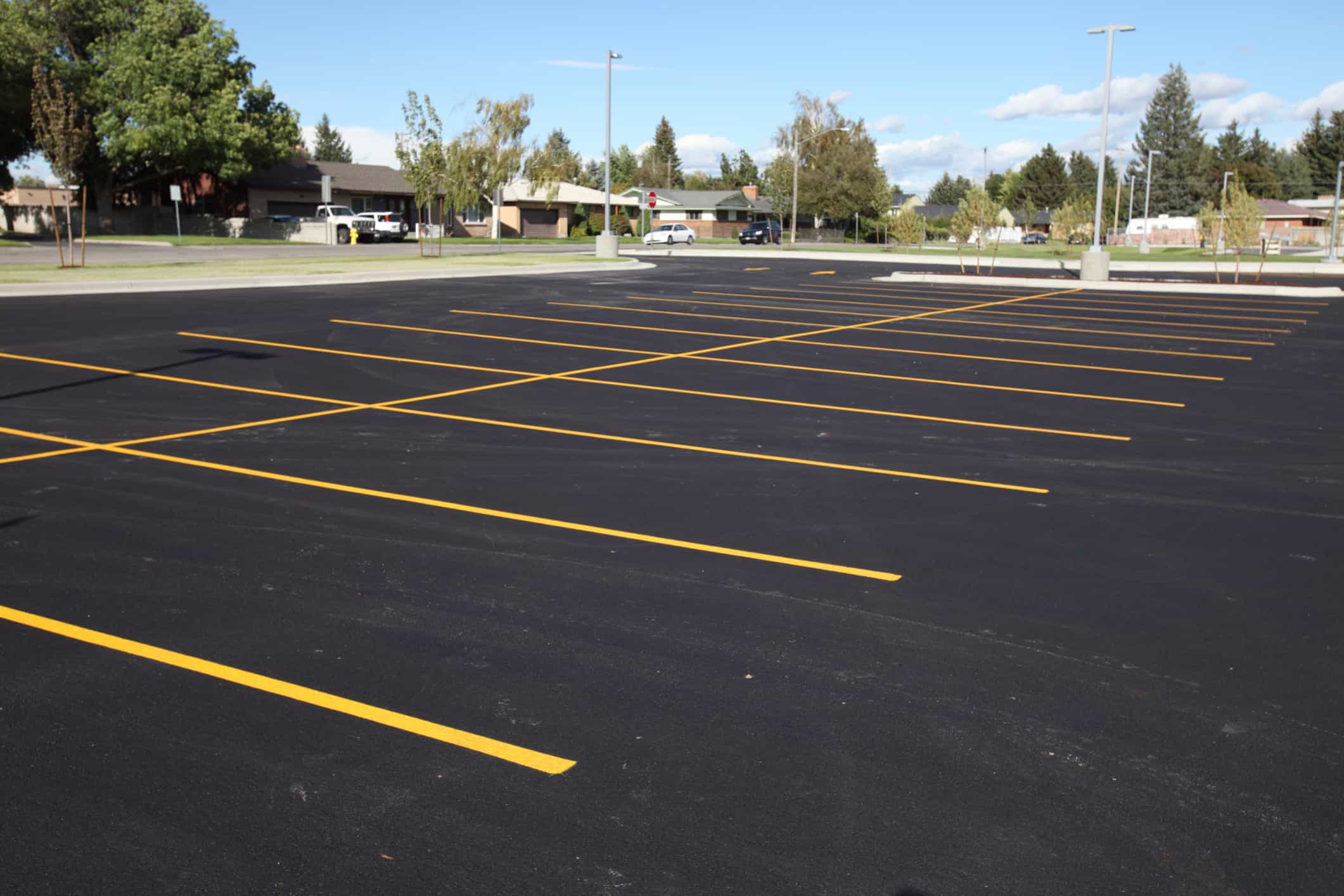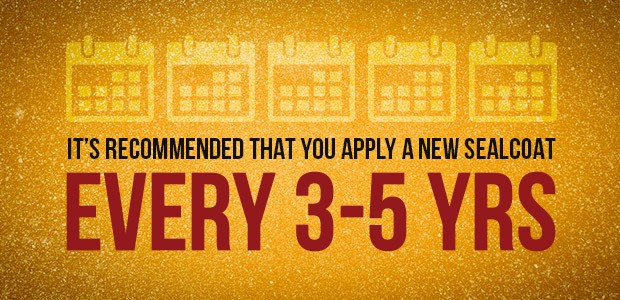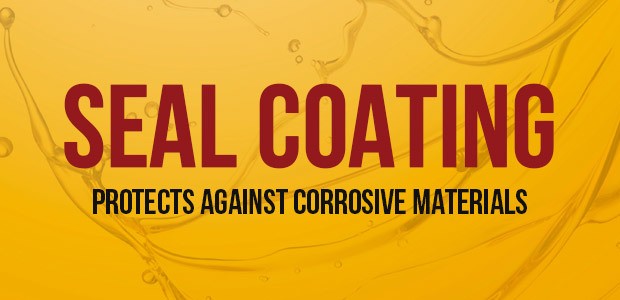

For businesses, a parking lot is a pretty basic necessity. It’s also a reflection of your company. You want the very first impression for your customers to be a good one. As they pull up to your business, you want your parking lot to be convenient and well-maintained.
Consider these recent statistics from asphaltroads.com: Smoother pavements result in longer pavement life. In fact, smooth pavement lasts 10-25 percent longer than rough pavement, resulting in significant maintenance cost savings. Property owners can save as much as $120,000 in repair costs on a 30,000 SF parking lot over 15 years by implementing a consistent sealcoating program. To put it in other words, the smoother the pavement, the happier the customer.
Why, then, do so many businesses seemingly neglect to maintain their parking lots? Perhaps they don’t know where to start or perhaps they simply take good asphalt for granted. Maybe they don’t know when to get commercial asphalt lots sealed. Maybe they don’t realize their customers are slowly getting frustrated with subpar parking surfaces.
With that in mind, we’ve worked to bring together our guide on when to seal an asphalt parking lot. All our tips are designed to help extend the life of your lot while making parking easier and safer for your customers. Considering that you only get one chance to make a first impression, we know your commercial lot is an important part of your success.
To really understand if you are due for a new lot sealcoating or not, you need to start by asking yourself a few questions. While parking lots may seem to be unimportant and may go unnoticed, by taking a moment and truly considering the condition and age of your lot with pavement inspections, you may discover there is much you can do to improve the condition of your parking surface. Start with these questions:
If your asphalt is brand new, you do not need a sealcoat. By the time it is between 6 months to a year old, you will want to think about when to apply a sealcoat because parking lots can be worn down by water, air, snow and traffic.
Now, just because your asphalt is a year old does not mean it needs a sealcoat. There are a lot of additional factors that will help you determine when you need to apply a sealcoating, but these questions all come after first assessing the age of your pavement.

If your asphalt is older than a year, you next have to determine when you applied your last sealcoat. It is recommended that you apply a new sealcoat every three to five years. This will help preserve the surface of your asphalt while preventing far more expensive repairs further down the road.
Of course, even if you’ve never applied a sealcoat or simply cannot remember when the last one was applied, surface deterioration is another tell-tale sign that you need to apply a sealant as soon as possible. Even minor wear, such as small cracks or a surface color change from black to gray, can signal it is time to consider minor maintenance. The transformation of the surface color from black to gray is usually the first sign of deterioration. Additionally, a parking lot with visible damage — big or small — might turn off customers from visiting your business.
Just because you see these signs doesn’t mean you have done anything wrong. They are often simply the result of minor wear and tear. Remember, parking lots carry heavy loads on their backs and are subject to the harshness of winter, a fact that is especially true here in Central Pennsylvania.
Your customers’ safety is one of your top priorities. As a business owner, you are at fault if a customer falls or injures themselves due to the parking lot’s condition. Even a small amount of damage can lead to someone tripping and falling. If your lot’s deterioration or damage is potentially harmful to customers, especially during adverse weather conditions, it may be time for a sealcoat.
While we often think about the effects worn-out parking lots can have on cars, we rarely think about how the damage can inhibit pedestrians. A sealant is a great way to keep them as safe as possible while on your premises.
If your area experiences weather conditions like snow, rain, wind or even sunlight, it may be time for a sealcoat. Likewise, excess traffic and tire wear might require your lot to get a sealcoat. Pavement is meant to be used and there’s no real way to escape from the elements, so needing parking lot repair and sealing doesn’t mean you’ve done anything wrong. It means you’re doing what you can to keep it safe!
Sealcoating protects asphalt pavement from everything from water damage to corrosive materials. Overall, it is a great way to protect your investment. Asphalt maintenance is not disruptive to your business and it’s inexpensive and easy. With that in mind, here’s further proof of why you should sealcoat your asphalt.
It seems counterintuitive that something as hard as asphalt can be damaged by water. Unfortunately, water is one of the biggest enemies of pavement.
Small amounts of water can penetrate the tiny cracks in asphalt’s surface. When that water seeps into those cracks and then freezes in winter, the water expands, thus expanding the crack. Then, when water fills that now slightly larger crack and freezes, the crack expands again. Eventually, this process of repeated expansion of water-filled cracks produces large, potentially dangerous fissures and potholes on your surface.
Sealcoating provides your asphalt with a protective waterproof barrier. That means even those initial micro-cracks are protected from water seepage.
Sealcoating also slows damage from oxidation. When pavement oxidizes, it becomes brittle and more prone to cracks. You can’t completely stop oxidation since it comes from the air and sun, but a sealcoat can slow it down. When the sealant is applied, it takes the brunt of air and sun damage and protects the pavement underneath. Just as with water damage, it acts as a protective barrier.

Water isn’t the only liquid that can damage asphalt pavement. Gasoline, motor oil, antifreeze and de-icing chemicals can all stain, corrode and destroy your surface. While it is important not to let these types of hazardous chemicals sit for long periods of time, since they can be poisonous to wildlife, a sealcoating will make sure they stay on the surface, thus saving your asphalt from further wear and tear.
While sealcoating isn’t solely cosmetic, it definitely has cosmetic advantages. Sealcoating preserves that brand-new black asphalt look, preventing it from becoming a dull gray. Additionally, if your asphalt has begun to show signs of age, it will restore its appearance.
While cosmetics shouldn’t be your only motivation, remember that your parking lot is often the first impression you make on a new customer. So if you want your lot to look new, safe and accommodating, sealcoating is the best way to extend its new appearance.
Similarly, sealcoating will make the lines on your parking lot pop. Again, this may seem like a superficial issue, but not only do brightly painted lines look better, they also help encourage safe and dent-free parking. By keeping your individual parking spaces clearly marked, your customers will find parking straight in a spot easier, limiting the chances that a customer will come out to the frustrating sight of a ding in their car door.
Customers who have to drive through potholes or dents in your parking lot might have a less satisfying experience with you, regardless of how excellent your customer service is once they’re inside. Sealcoating helps you maintain a professional-looking parking lot so that customers can enjoy their visit to your business from the very beginning to the very end.
It may seem that sealcoating every couple of years is a luxury and not a necessity. On the contrary, getting a new seal coat can save you a lot of money down the road by taking care of minor cracks and damages before they turn into something potentially more extensive and expensive.
Now that you have an understanding of what sealcoating does and when to get a commercial asphalt lot sealed, what are your next steps?

We’ve given you a good eyeball test for deciding if it’s time to get a new sealcoating. However, in order to be sure that it is the best time to get an asphalt lot sealcoated, you should get a professional opinion. First, a professional will determine if a new sealcoating is actually going to fix the issues. If your cracks are too extreme or your pavement is too worn, you may need to consider a full resurfacing rather than a sealcoating.
A professional will also be able to spot those smaller trouble spots you may have missed. These small cracks can be addressed easily and affordably when they are still minor, preventing you from more expensive fixes later.
A professional will also begin to discuss what sort of preparations you need to make in order to make sure the sealcoating application will last for as long as possible. Based on these insights, your contractor will be able to provide you with a quote on the cost and expected timeline of the project.
For more information on Daniel B. Krieg’s commercial sealcoating services for the Harrisburg, PA region and beyond, feel free to fill out a form online or give us a call at 800.334.4929.
While sealcoating is vital for ensuring your surface survives the winter, the best time to get an asphalt lot sealcoated is during the warmer months. Before even considering the sealcoating application, the temperature needs to be consistently higher than 65 degrees, both day and night. While a warm spring may be appropriate, it is probably best to wait for summer. Similarly, make sure to get the job done before it starts to get cold again. While July might not be the usual time for preparing for winter, when it comes to sealcoating, you don’t want to think about the process too late in the year.
Once you have scheduled an appointment, you need to make sure your surface is as clean as possible to ensure a proper seal. That means not spreading fertilizers – whose chemicals can react with the sealant – and turning off any sprinkler systems to make sure the surface is not wet.
Additionally, if you can, the most efficient way to have your surface resealed is to close your parking lot for a day or two. However, if you need to keep at least part of your lot open, you can also partition one area for parking while sealcoating the rest. Once the newly sealcoated section is ready for traffic, just switch the areas.
Call Us Today For Sealcoating Services!
Once you’ve set up your appointment, your job is done. The rest is up to the professionals who have years of experience applying sealcoat. Still, what the process can you expect when we’ve arrived to get the job done right?
You want your sealcoat to go all the way to the edge of your surface. That means we need to edge away any grass that might be in contact with the very edge of your lot.
Many problems with asphalt surfaces begin at the edges, as they tend to be more porous. We’ll trim any grass here, creating a clean surface for our sealcoat to cover the pavement’s edge. This will improve both the life of the sealcoat and your asphalt.
Our next task is making sure there is no debris or dust that could damage the sealcoat application. The specific equipment used will depend on the size of your lot, but for most surfaces, we use some sort of combination of a high-pressure blower and mechanical rotary brush.
Unfortunately, oil spots prevent adherence of the sealcoat and cannot be removed by mechanical cleaning equipment. In order to address this issue, we use a primer to cover the oil spots. Once that is completed, the sealcoat will not have any issues adhering to surface.
After cleaning and treatment, we next repair all and any cracks. We use a rubberized crack filler that will prevent further water damage.
At this point we block traffic as required by the job in order to ensure no cars damage the sealant.
This is where we do the real work of sealing and preserving your surface. We apply our coal tar emulsion sealcoating using either a brush or sprayer, depending on the size and condition of your asphalt. We always brush the edge of the lot by hand so emulsion isn’t accidentally sprayed on any unintended surfaces. This will also give the edge of your lot a clean, sharp, professional surface.
As you can see, sealcoating is important, but so is getting it done right. If you have more questions about our approach to sealcoating, feel free to explore further.
A good sealcoating will improve the life and look of your parking lot. While many business owners might neglect their parking surfaces, we can assure you that a good, smooth pavement will make your customers happier. Now that you know when to reseal a commercial parking lot, go outside, look at your lot and ask yourself if you are making the best first impression that you can.
Contact the experts at Daniel B. Krieg to get more information on our commercial sealcoating services. You can reach us online or by phone at 800.334.4929.
Please contact Daniel B. Krieg, Inc. by filling out the form below, or by calling us at one of our locations.